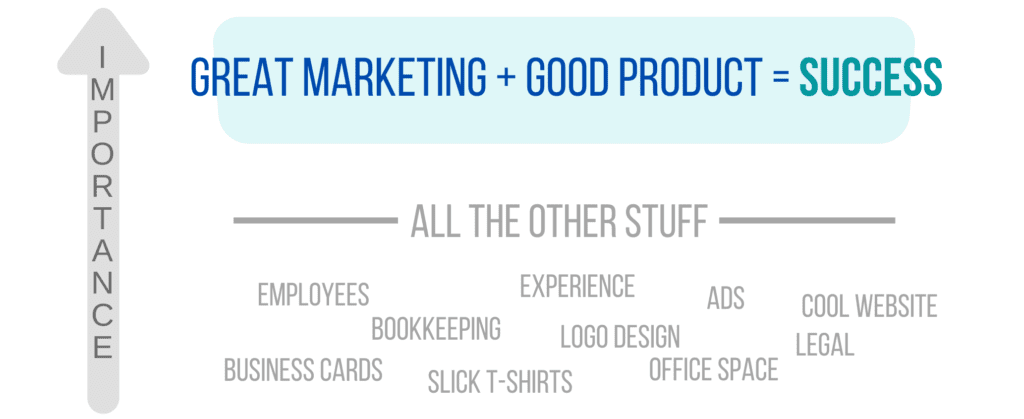Business Basics
What do you need to know about business basics – to start and run your own business?
What does a healthy business look like?
(it’s really simple actually!)How do I know if my business will work?
What do I need to know to run a business?
Basic business terms you should know
Where do I start?

What does a healthy business look like?
(it’s really simple actually!)
Building a business can be really confusing for a lot of reasons – but one thing that isn’t confusing is what a healthy business looks like. A healthy business is one where revenues are greater than expenses. That’s it.
It’s SO EASY to lose sight of that simple goal when you’re building a business. You get caught in in your designs, your marketing, your hiring, your production or your business cards or social media.
But if you think each day “how can I pull more than enough sales to cover all my costs?” that will really help you make the important decisions and focus on what’s most critical.
How do I know if my business will work?
Ultimately, you can’t really know for sure without trying it. But there are a lot of things you can do to help you make an educated guess about your business. The most important suggestions we have is:
- Take the free Business Evaluation Quiz on this site
- Spend a lot of time on research and planning phase including a solid Business Plan and lots of guidance from mentors who’ve built businesses before.
- Use all the available methods of validating or testing your business before you commit to building the whole thing
What do I need to know to run a business?
For starters, read everything on this site. StartABusiness.Center has one primary goal: to educate entrepreneurs about how to build a business and minimize their risk.
Honestly there is so much you will learn, you can’t know it all beforehand, you have to simply start going down the path. Mentors are the best way to speed your learning.
Focus on the basics for now. High revenues, low expenses, customer acquisition, strong marketing plans. If you’re good at just those four things, the rest should work out wonderfully.
Where do I start?
This is your high level roadmap:
- Begin by finding an idea that you think has great potential
- Take the Business Evaluation Quiz to learn more about your idea
- Study and understand our Steps To Start A Business here
Basic business terms you should know:
Balance sheet
a statement of the assets, liabilities, and capital of a business often detailing the balance of income and expenses over a period of time
Business entity
An entity recognized by the state and tax laws which is formed to conduct business. Typically, an LLC, an S-Corporation, a C-Corporation, a General Partnership or a Sole Proprietorship. There are others.
Capital
Another word for cash or money
Cash flow
The total amount of money that your business bank account takes in over a period.
Cost of goods
The cost of purchasing or making your sellable products. Often these are products waiting to be sold.
Crowdsourcing
Using the online network of users to gang together and accomplish something such as pitching in to fund your business, or to source your products or services.
DBA
“Doing Business As” – it is the name you give your company that you use for your customers. Sometimes your legal business entity name is different.
Distribution channel
A separate customer source for sales, such as a Farmer’s Market, email marketing list, a Target store, or a Nike store, a chain of stores, or online.
EBIT or EBITDA
Earnings Before Interest & Taxes (EBIT) or Earnings Before Interest Taxes Deperciation & Amortization (EBITDA). Basically these terms refer to your true profits after all expenses and tax considerations are calculated in. It’s the best way to know what your company actually earns.
Email blast
A mass email sent out to a group of potential customers normally to market your product.
Email marketing
The use of email lists to send marketing emails to groups of potential customers. Normally one does this with a paid service like MailChimp (there are many).
Equity
Ownership shares in a company.
Expense
The opposite of revenue/income. Could be salary, rent, cost of goods, advertising, or many other things.
Financial projection
A spreadsheet that shows in detail your guesstimate of number of sales, customers, revenue, expenses, etc. so that you can make an educated guess about how much money your business should or could make.
Income statement
Also known as a P & L or Profit and Loss statement this is a short document that focuses on your income and expenses to show basic profit.
Incorporation
The act of creating a formal legal business entity such as an LLC or an S-Corporation. This can be done by you alone, or by hiring an online service, or by hiring a local attorney or tax person who offers this service.
Investor
A person who gives money to a business in the hopes that they will make money from that investment.
Logistics
The term used for the part of your business that involves management, moving and shipping of products. FedEx is in the business of logistics.
Loss
When your business has greater expenses than revenues, you show a loss. This needs to be fixed ASAP or your business dies.
Margin
The percentage of profit you make on whatever you sell. If you sell books for $50 that cost you $25, your margin is 100%.
Marketing
The act of telling the world about your product or service. This can be via advertisement, email marketing, blog writing, social media, radio, tv, word of mouth, affiliate marketing, partnering, etc.
Mentor
An advisor who has more experience than you do (often much more). Mentor are incredibly helpful in keeping you from making rookie mistakes and providing perspective and guidance that you may be missing.
Non-paid advertising
Any form of marketing that you don’t pay for directly. Most commonly this is through social media, email marketing, and online website effort.
Paid advertising
Any form of marketing that you pay directly for such as Facebook or Google ads, billboards, or print ads.
Payment gateway
The financial term for the business that actually processes the credit card transaction itsThis is often your bank.
Payment processor
The financial term for the business that accepts credit card payments like VISA, etc. This is often your bank.
Paypal
One of the best known payment services. Paypal can act as a payment gateway so you can take credit cards. Also for billing customers or processing monthly subscription payments. You can add “Buy Now” buttons to your website very very easily if your payment needs are simple.
Profit
In the simplest terms, profit is the result of your revenue minus your expenses.
Return on investment
The amount of income that is generated from your marketing investment. You spend $100 on paid ads, and you generate $200 in sales…that’s a 100% ROI (return on investment).
Revenue
The amount of money your business earned in sales over a period. (Some of it might not hit your bank for days or months)
Risk
The possibility of financial loss in a business. Risk is inherent, the opposite of the reward. Both are possible. Entrepreneurs know there’s a chance they could lose their investment, or gain from it.
SEO
Search Engine Optimization. This is the pursuit of tweaking your website so that Google and other search engines view your site as a favorable result when someone enters a search term. All online businesses take their SEO efforts very seriously.
SaaS
Software as a Service. This is usually a third party software solution that helps you do business without having to build it yourself. Examples are email marketing tools, customer relationship management (CRM) tools, productivity apps, and a million others.
Shopify
The leader in providing ecommerce websites to those who wish to sell online. Primarily the specialize in online stores. Basically good choice.
Social media
Every business needs to use social media to connect with and locate customers these days. Instagram and YouTube are probably the most critical, followed by Facebook, Twitter and TikTok. By providing users on these massive networks with content of value, your business gains followers and attention.
Square
Similar to Paypal. A well-known and trusted payment solution for accepting credit cards and payments online.
Squarespace
Similar to Wix.com – a well-known solution for building a website. They provide good looking templates and a fairly intuitive drag and drop interface. They host the site for you.
Stripe
Similar to Paypal. A well-known and trusted payment solution for accepting credit cards and payments online.
Venture capital
Investment money for your business funding, typically from professional investors who are well-versed in evaluating risk and reward. You’ll need a great pitch deck to pitch your idea to VCs and prepare to be asked a lot of hard questions. But if they decide to invest in you, you receive their expertise and assistance which can be very valuable.
Wix
Similar to Squarespace.com – a well-known solution for building a website. They provide good looking templates and a fairly intuitive drag and drop interface. They host the site for you.
WordPress
A hugely popular website publishing platform. Allows you to build a website on your own hosting account, using drag and drop tools. Can be difficult for those without experience, but it can be learned without too much effort. This site is built using WordPress.
 I help people with their business questions and goals. I've helped hundreds and I can give you the guidance and mentoring you need to figure out every step. Why learn the hard lessons yourself, when you can consult with an expert who can save you valuable time and money?
I help people with their business questions and goals. I've helped hundreds and I can give you the guidance and mentoring you need to figure out every step. Why learn the hard lessons yourself, when you can consult with an expert who can save you valuable time and money?